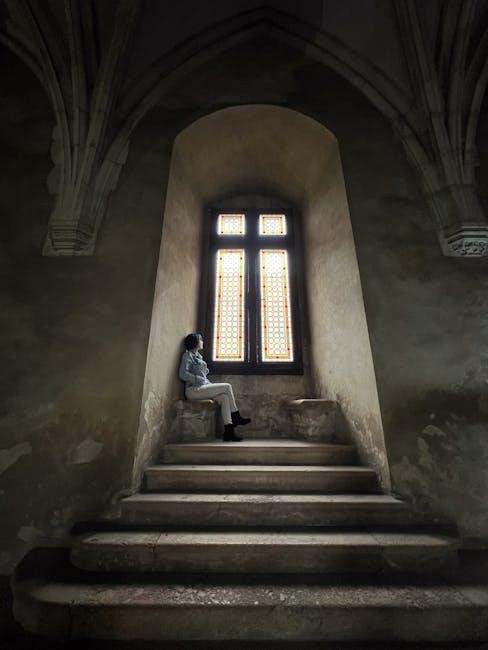
the glass castle pdf
“The Glass Castle” by Jeannette Walls is a compelling memoir about her unconventional childhood, exploring themes of resilience and family dysfunction. The book, available as a PDF, offers a vivid account of her nomadic upbringing and the complexities of her parents’ behavior, making it a powerful and moving read.
Overview of the Memoir
“The Glass Castle” is a memoir by Jeannette Walls that recounts her unconventional childhood with nomadic, dysfunctional parents. The book, widely available as a PDF, vividly captures her experiences of poverty, neglect, and resilience. It explores her complex relationship with her parents, her escape to New York, and her journey toward self-discovery. The memoir is both a heart-wrenching and inspiring account of family, identity, and survival, making it a deeply emotional and thought-provoking read for audiences worldwide.
Author Jeannette Walls and Her Background
Jeannette Walls is an American author and journalist, best known for her memoir “The Glass Castle.” Born in 1960 in Phoenix, Arizona, Walls grew up in a highly unconventional and often dysfunctional family. Her parents, Rex and Rose Mary Walls, were nomadic and struggled with personal demons. Despite the challenges, Jeannette developed a passion for writing and attended Barnard College. Before writing her memoir, she worked as a journalist for MSNBC and other publications. Her raw, honest storytelling in “The Glass Castle” has made her a celebrated author, offering insight into her extraordinary life and resilience.

Key Themes in “The Glass Castle”
Resilience, family dysfunction, and childhood trauma are central themes, exploring how Jeannette and her siblings navigate neglect, instability, and emotional pain while seeking hope and independence.
Resilience and Redemption
In “The Glass Castle,” resilience and redemption are explored through Jeannette’s journey. Despite facing neglect, poverty, and instability, she and her siblings adapt and thrive. Their father’s broken promises and mother’s detachment test their resolve, yet they find strength in each other. The memoir highlights how resilience becomes a survival tool, allowing them to rise above their circumstances. Redemption emerges as Jeannette forgives her parents, finding peace and understanding. The PDF version captures these themes vividly, making the emotional journey accessible to readers worldwide.
Dysfunctional Family Dynamics
The Glass Castle portrays a deeply flawed family structure, with parents often prioritizing their desires over their children’s needs. Rex Walls’ unpredictable behavior and Rose Mary’s detachment create a chaotic environment. The siblings frequently fend for themselves, showcasing both independence and neglect. The PDF highlights how this dysfunction shapes their identities, fostering resilience yet leaving emotional scars. The family’s unconventional dynamics are central to the memoir’s exploration of love, abandonment, and survival.
Childhood Trauma and Its Impact
In The Glass Castle, childhood trauma is a pervasive theme, shaping the lives of Jeannette and her siblings. The memoir vividly portrays the emotional and psychological scars left by neglect, instability, and exposure to dangerous situations. These experiences, such as being left to fend for themselves or enduring their father’s erratic behavior, deeply influence their worldview and relationships. The PDF version underscores how these traumas, while devastating, also foster resilience and a determination to escape their tumultuous upbringing.

Symbolism in the Memoir
The Glass Castle symbolizes hope and illusion, embodying Rex’s unfulfilled promises and the family’s longing for stability amidst chaos.
The Glass Castle as a Symbol of Hope
The glass castle represents hope and illusion, embodying Rex’s vision of a perfect future. It symbolizes the family’s longing for stability and security, despite their chaotic reality. For Jeannette, the castle becomes a bittersweet reminder of her father’s broken promises and unfulfilled dreams. Yet, it also sustains her, offering a fragile sense of hope amidst poverty and unpredictability. The castle’s duality mirrors the family’s resilience, blending fantasy with the harsh truths of their existence.
The Role of Fire in the Narrative
Fire in The Glass Castle symbolizes both destruction and transformation, reflecting the chaos of the Walls’ lives. Rex’s fascination with fire mirrors his unpredictable nature, while Jeannette’s childhood burns mark her resilience. Fire also represents the family’s constant upheaval and the fragile line between danger and survival. These incidents underscore the memoir’s themes of resilience and redemption, as the characters repeatedly rise from the ashes, literally and metaphorically, to face new challenges.
Major Characters in the Memoir
The memoir centers around Jeannette Walls, the resilient protagonist, and her unconventional family, including her charismatic but troubled father Rex Walls, her artistic mother Rose Mary Walls, and her three siblings, each navigating their own struggles and growth.
Jeannette Walls: The Protagonist
Jeannette Walls is the narrator and central figure of The Glass Castle. Born into a dysfunctional family, she endures a nomadic childhood marked by neglect and instability. Her resilience shines as she navigates poverty, hunger, and emotional turmoil. Jeannette’s journey from vulnerability to self-reliance is a testament to her strength. Her complex relationship with her parents, especially her father, shapes her identity. Through her storytelling, she captures the paradox of love and dysfunction, offering a raw yet hopeful perspective on her extraordinary life.
Rex Walls: The Father
Rex Walls, Jeannette’s father, is a charismatic yet deeply flawed figure. His unpredictable behavior, fueled by alcoholism and a rebellious spirit, creates a chaotic environment for his children. Despite his brilliance as an inventor and storyteller, Rex’s inability to provide stability leaves lasting scars. His promises of a better life, symbolized by the “glass castle,” contrast sharply with the neglect and uncertainty he perpetuates. His complex character evokes both admiration and frustration, shaping Jeannette’s resilience and worldview.
Rose Mary Walls: The Mother
Rose Mary Walls, Jeannette’s mother, is a free-spirited artist who often prioritizes her creative pursuits over parental responsibilities. Her unconventional parenting style, marked by neglect and emotional detachment, deeply impacts her children. Despite her intelligence and artistic talent, Rose Mary struggles with practical life, leaving her children to fend for themselves. Her complicated relationship with Rex and her enabling of his behavior contribute to the family’s dysfunction, making her a pivotal yet divisive figure in Jeannette’s life.
The Siblings: Their Roles and Struggles
Jeannette’s siblings—Lori, Brian, and Maureen—each play distinct roles in the memoir. Lori, the eldest, often acts as a protector and provider, while Brian shares in the siblings’ adventures and struggles. Maureen, the youngest, faces unique challenges, particularly as she grows older. Together, they navigate neglect, instability, and emotional turmoil, relying on one another for support. Their shared experiences foster resilience and a deep bond, shaping their individual journeys and collective strength in overcoming adversity.
The Memoir’s Impact and Reception
“The Glass Castle” has received widespread acclaim for its raw honesty and emotional depth, resonating with readers globally and sparking meaningful reflections on family and resilience.
Critical Acclaim and Reviews
Critics have praised “The Glass Castle” for its raw honesty and gripping narrative. Reviewers highlight Jeannette Walls’ ability to recount her unconventional upbringing with vivid detail and emotional depth. The memoir’s unflinching portrayal of family dynamics and personal resilience has earned it a place among top literary works. Many have noted its thought-provoking exploration of childhood trauma and its enduring impact. The PDF version maintains the original’s compelling storytelling, making it a must-read for those interested in powerful memoirs. Its digital format ensures accessibility, reaching a broader audience.
Readers’ Emotional Responses
Readers of “The Glass Castle” often describe feeling deeply moved by Jeannette Walls’ story. The memoir evokes strong emotions, ranging from empathy for her childhood struggles to admiration for her resilience. Many readers find themselves reflecting on their own family dynamics and experiences. The PDF format has made the book more accessible, allowing a wider audience to connect with its emotional depth. The narrative’s authenticity leaves a lasting impact, sparking conversations about hope, survival, and the complexities of love and family.

“The Glass Castle” as a PDF
“The Glass Castle” is widely available as a downloadable PDF, offering readers convenient access to Jeannette Walls’ powerful memoir. Popular platforms like Amazon and Google Books provide easy access, ensuring the story reaches a global audience. The PDF format allows for seamless reading across devices, making it a preferred choice for many readers seeking to explore this captivating narrative.
Availability and Accessibility
“The Glass Castle” in PDF format is widely accessible across various platforms, ensuring readers can easily download or purchase the memoir. Many e-bookstores, libraries, and online retailers offer the PDF version, making it simple to acquire. The format is compatible with multiple devices, including e-readers, tablets, and smartphones, allowing readers to enjoy the book anywhere. Additionally, some websites provide free previews or samples, enabling potential readers to explore the memoir before purchasing. This accessibility has helped broaden the book’s global reach and popularity.
Popular Platforms for Download
The PDF version of “The Glass Castle” can be downloaded from various popular platforms. Amazon Kindle, Barnes & Noble Nook, and Google Play Books are among the most widely used options. Apple Books and Kobo also offer the memoir for download, ensuring accessibility across different devices. These platforms provide a seamless and secure way to purchase and download the book, making it readily available to readers worldwide. This convenience contributes to the memoir’s widespread popularity and ease of access for fans of Jeannette Walls’ work.
Adaptations and Related Works
The memoir inspired a successful film adaptation in 2017, starring Brie Larson as Jeannette Walls. This adaptation brought the story to a wider audience, enhancing its popularity and cultural impact. Additionally, Jeannette Walls has written other works, including “Half Broke Horses,” further showcasing her storytelling talent and deepening readers’ connections to her experiences.
The Film Adaptation
The memoir was adapted into a film in 2017, directed by Destin Daniel Cretton and starring Brie Larson as Jeannette Walls. Woody Harrelson portrayed Rex Walls, bringing his larger-than-life personality to the screen. The film captures the emotional depth of the book, focusing on themes of resilience and family dynamics. It received positive reviews for its authentic portrayal and strong performances, making it a compelling companion to the PDF version of the memoir. The adaptation further amplified the story’s reach and impact.
Other Literary Works by Jeannette Walls
Jeannette Walls has written several works beyond The Glass Castle, showcasing her literary talent. Her novel Half Broke Horses (2009) fictionalizes her grandmother’s life, exploring themes of resilience. Another novel, The Silver Star (2013), follows siblings facing adversity. These works highlight her ability to weave compelling narratives, blending raw emotion with vivid storytelling, further cementing her reputation as a gifted author. Her writing style remains deeply personal and engaging, resonating with readers across genres.

Educational Use of the Memoir
The Glass Castle is widely used in educational settings, valued for its raw portrayal of family dynamics and resilience. It sparks meaningful discussions in English and psychology classes, encouraging critical thinking and empathy. Teachers often assign it to explore themes of identity, poverty, and trauma, making it a powerful tool for fostering deeper understanding and analysis among students.
Teaching “The Glass Castle” in Schools
The Glass Castle is a compelling choice for educational curricula, offering insights into complex family dynamics and personal resilience. Educators use the memoir to explore themes of identity, poverty, and trauma, fostering empathy and critical thinking. Its raw narrative engages students, prompting discussions on morality and survival. The PDF version enhances accessibility, allowing teachers to incorporate digital tools for analysis. This memoir aligns with educational goals, providing a relatable and thought-provoking text for adolescent and young adult audiences.
Study Guides and Resources
Study guides for The Glass Castle provide in-depth analysis, discussion questions, and essay prompts, helping students grasp the memoir’s themes and complexities. Available online or as PDF downloads, these resources include character analyses, historical context, and literary devices. Educators often use them to facilitate class discussions and assignments. The guides also offer insights into Jeannette Walls’ writing style and the memoir’s cultural significance, making them invaluable for both students and teachers exploring this powerful narrative.
Trigger Warnings and Content
The Glass Castle contains graphic themes of abuse, neglect, and trauma, potentially distressing for some readers. Mental health struggles and addiction are also prominent, requiring caution.
Themes of Abuse and Neglect
The Glass Castle vividly portrays themes of abuse and neglect, detailing Jeannette’s harrowing childhood. Her father, Rex, oscillates between charm and dysfunction, often prioritizing alcohol over his children’s welfare. Physical and emotional abuse are evident, such as when Jeannette is burned in a fire and her father’s dismissive response. The memoir also highlights neglect, as the children frequently fend for themselves, facing hunger and unsafe living conditions. These themes underscore the long-term emotional scars left by such experiences.
Mental Health Discussions
The Glass Castle delves into mental health struggles, particularly Rex Walls’ alcoholism and its ripple effects on the family. The memoir highlights emotional scars, coping mechanisms, and the long-term impact of neglect. Jeannette’s dissociation and her siblings’ varied responses to trauma illustrate diverse mental health journeys. The narrative also underscores resilience, showing how the children adapt and survive despite psychological distress. These discussions provide a raw yet insightful look into the mental health challenges faced by the family.
Comparisons to Other Memoirs
The Glass Castle shares themes of resilience and family dysfunction with memoirs like The Liars’ Club and Running with Scissors, offering a unique, raw perspective on childhood trauma and survival.
Similar Stories of Resilience
Memoirs like “Educated” by Tara Westover and “Hillbilly Elegy” by J.D. Vance share similar themes of resilience and overcoming chaotic childhoods. These stories, like “The Glass Castle”, highlight the strength of the human spirit in the face of adversity. Each narrative offers a unique perspective on survival, self-discovery, and the long-term effects of family dynamics. These works resonate deeply with readers, providing hope and understanding for those who have experienced similar struggles. The universal theme of resilience binds these memoirs together.
Unique Aspects of “The Glass Castle”
“The Glass Castle” stands out for its vivid storytelling and unflinching honesty. Jeannette Walls’ ability to balance humor with raw emotion creates a unique narrative voice. Unlike other memoirs, the book’s portrayal of a dysfunctional family is both heart-wrenching and oddly uplifting. The blend of dark humor and intense emotional depth sets it apart. Additionally, the complex characterization of Rex Walls, a flawed yet charismatic figure, adds layers to the story, making it unforgettable. This memoir’s originality lies in its unapologetic yet compassionate perspective.

The Author’s Reflections
Jeannette Walls reflects on her unconventional childhood, expressing mixed emotions about her parents. She shares insights into her healing journey and the catharsis of writing “The Glass Castle.”
Jeannette Walls on Her Childhood
Jeannette Walls openly reflects on her unconventional upbringing, describing her childhood as chaotic yet strangely liberating. She recalls her parents’ eccentricities and how they shaped her resilience. Despite the challenges, Walls expresses gratitude for the lessons learned, emphasizing how her experiences influenced her writing. She acknowledges the emotional turmoil but also highlights the unique bond she shared with her family. Her reflections offer a poignant yet hopeful perspective on overcoming adversity.
Her Relationship with Her Parents
Jeannette Walls’ relationship with her parents, Rex and Rose Mary, is complex and deeply emotional. She often felt torn between admiration for their unconventional spirit and frustration with their neglect. Rex’s charismatic yet unreliable nature left her seeking validation, while Rose Mary’s detachment fueled her feelings of abandonment. Despite this, Jeannette developed a unique bond with both, blending love and resentment. Her parents’ flaws shaped her resilience and influenced her perspective on family and independence.

The Future of “The Glass Castle”
The memoir continues to inspire future generations, solidifying its cultural legacy. Its themes of resilience and redemption ensure lasting relevance, fostering ongoing discussions and adaptations.

Legacy and Cultural Impact
The Glass Castle has left an indelible mark on modern literature, sparking conversations about family dynamics and personal resilience. Its raw honesty resonates globally, making it a timeless classic. The memoir’s themes of overcoming adversity continue to inspire readers, fostering empathy and self-reflection. As a PDF, it remains accessible, ensuring future generations can engage with its powerful narrative. Its cultural impact lies in its ability to challenge societal norms and promote understanding of complex family relationships.

Possible Future Adaptations

The Glass Castle could see future adaptations beyond its film version, potentially as a TV series or stage play. Its rich narrative offers depth for exploration in serialized formats. Enhanced digital versions, including interactive PDFs with multimedia elements, might also emerge, enriching reader engagement. The memoir’s universal themes ensure its appeal for diverse adaptations, continuing its cultural relevance and reaching new audiences while maintaining its emotional core and authenticity.

antibiotic table pdf
You May Also Like

overhead door legacy 850 manual
February 26, 2026
scarred alpha by norisha may pdf
August 4, 2025
